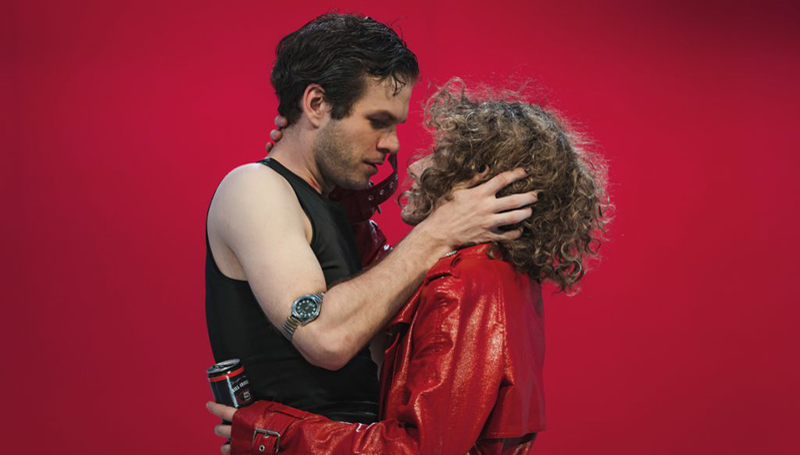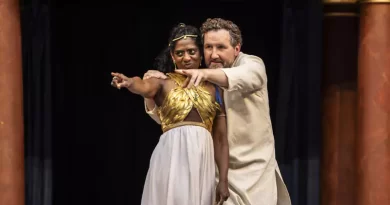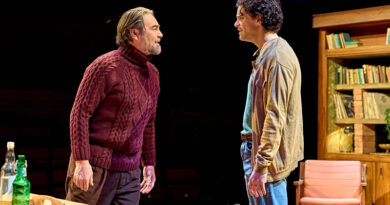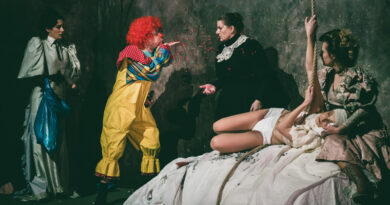“Happy End” – Renaissance-Theater Berlin
Hans-Jürgen Bartsch in Berlin
23 July 2022
The musical comedy Happy End , which Bertolt Brecht and Kurt Weill opened in 1929 at the Theater am Schiffbauerdamm (now Berliner Ensemble), did not attain the same popularity as their Threepenny Opera which had been premiered at this venue a year previously and had assured them immediate worldwide success that has lasted until today, and not only in Germany. Happy End fared less well. In Berlin, theatre enthusiasts had to wait more than 50 years for an opportunity to rediscover or – as the younger generation is concerned – discover it, thanks to a revival at the Renaissance-Theater.

Gabriel Schneider as Bill and his gang. Photos: Max Jackwerth.
Brecht was not known for being generous in giving credit to associates who contributed to his productions. Long after the premiere of Happy Day, his admirers learned that this comedy had in fact been created by a trio: Elisabeth Hauptmann, the maestro’s long-time collaborator, had written the story, Brecht had penned the lyrics of the songs and Weill had set them to music. Some of these, like the “Bilbao Song” or “Surabaya Johnny”, have become hits. Many spectators could have sung or at least hummed along.
With 570 seats and a medium-sized stage (9 by 6 metres), the Renaissance-Theater is one of Berlin’s smaller playhouses. It is not known for producing lavish musicals. The revival of Happy Day at this venue was therefore a surprise … and a resounding success for the eleven actors/singers (directed by Sebastian Sommer) and the seven-member band (conducted by Harry Ermer). They did full justice to this rather offbeat comedy.
It opens with one of the protagonists announcing a show that would start “hollywoodly” and close “happyendly”. In the following two hours we are taken through an unlikely love story featuring the young kingpin of a Chicago gangster band and the young – and naïve – leader of a Salvation Army choir. Bill Cracker (Gabriel Schneider), who has just outmanoeuvred and replaced a rival, plays the cocksure winner of gang warfare when he encounters Lilian, the Salvation Army girl (Sophia Euskirchen). She accuses him of cowardice (“Your crimes do not require courage, only the absence of the police”) and admonishes him for having no principles (“Why do I never see you in church?”). In lieu of a retort, he simply offers her a can of beer thus avoiding a cantankerous exchange. Whereupon they fall in love: he with her because of her wonderful voice, and she with him because of his irresistible charm. She discards her uniform for a shiny red imitation leather coat, which sets her apart from the gangsters who are uniformly dressed in black (costumes by Wicke Naujoks) and the two kiss passionately. Macho showing-off and missionary zeal are forgotten.
However, this is not yet the happy ending we’ve been promised. Bill hasn’t reckoned with the Dame in Grey, nicknamed “The Fly”, the suprema of local gangland who accuses him of betrayal and sentences him to death. As we have witnessed before, whenever she asks a misbehaving gang member for a spark to light her cigarette, the gesture signifies a death warrant. But canny Bill manages to avoid execution by absconding. Lilian is thrown out of the Salvation Army for having betrayed her Christian beliefs.
A soppy coda concludes the burlesque: Bill and Lilian are forgiven their faux pas and welcomed back to their cliques who resolve to unite in the fight against capitalism. Brecht has the last word (borrowed from The Threepenny Opera): “Was ist der Einbruch in eine Bank gegen die Gründung einer Bank?” (“What’s breaking into a bank compared with founding a bank?”).
Happy End is great entertainment, abounding in mockery, parody, satire and irony and superbly performed. I could have done with less slapstick but this is a minor quibble. Judging by the tumultuous applause at curtain call, the production will be remembered as the theatre’s highlight of the 2021-2022 season. After the Theaterferien, the traditional summer recess, performances will resume in September and October, each time for a week, to inaugurate the next season.









